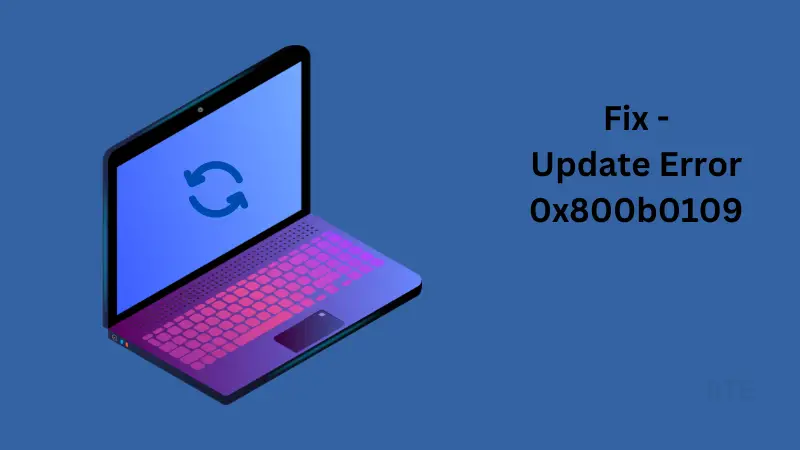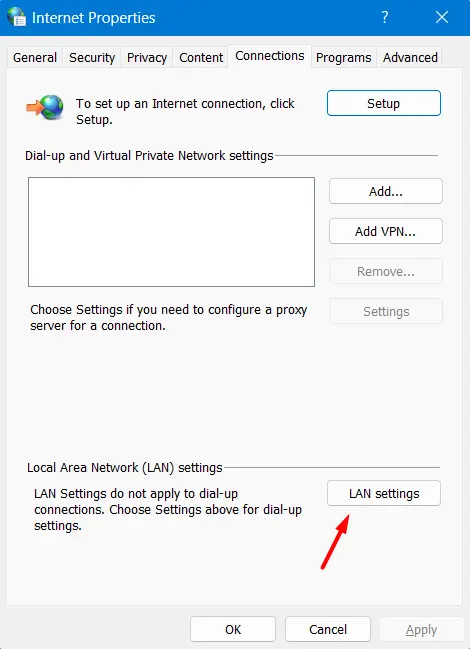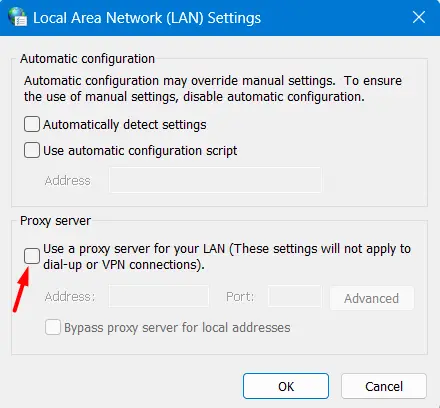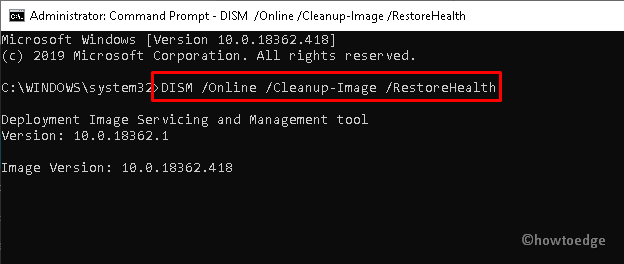Error 0x800b0109 and 0x800b0100 are basically update-related issues that occur when you are upgrading your OS to its next available Build update. The presence of corrupt or damaged system files and folders mostly trigger such an error code in Windows.

Ways to Fix Error 0x800b0109 in Windows
Since you are here, you might also be encountering this error code and are searching for some proper fixes to overcome this issue. Well, in this post, we have discussed five working solutions that should resolve this issue on Windows 11/10.
The fixes include disabling the proxy, running the update troubleshooter, repairing Windows Image using DISM, and a few others. Let’s learn how to apply these fixes on your computer.
1. Disable the Proxy Settings
- Press the Windows key + R to launch the Run dialog.
- Type inetcpl.cpl on it followed by the Enter Key.
- The system will redirect you to the Connections tab under Internet Properties.
- Locate and click on the button – LAN settings.

- Remove the tick in the checkbox against “Use a proxy server for your LAN“.

- Click OK and the recent changes will be saved inside the Internet Properties window.
Restart your PC and check if you are now able to update Windows without getting into the error code 0x800b0109 again.
2. Run the Windows Update troubleshooter
Update troubleshooter is an in-built tool in Windows that can diagnose and repair the underlying causes resulting in an update issue on Windows PC. Here’s how to perform this task –
Windows 11:
Open Windows Settings by pressing Windows Key + I, and navigate to the below path inside it.
System > Troubleshoot > Other troubleshooters
Locate Windows Update under Most frequent, and hit the Run button available on its right end.

When the troubleshooter launches, click Next and follow the on-screen instructions. Wait for this tool to detect and fix the underlying causes of your system. After this is over, you may restart your PC and check if you can update your OS without getting into some error code.
Windows 10:
- Press Win + I to open Windows Settings.
- Go to Update & Security > Troubleshoot, and click Additional troubleshooters on the right pane.
- Locate and click to expand the Windows Update section.
- You will see the Run the troubleshooter button inside it. Well, click on it and follow the on-screen instructions to complete the troubleshooting.

That’s it, this will look for any update-related issues and resolve the same.
3. Run the DISM tool
The presence of any corruption within the System Image might also prevent your device from upgrading to the next available Build version. If that’s the case, you better find and resolve the corruption using the DISM tool. Here’s how to use this tool in Windows –
- Open Windows Search (Win + S), and search for Command Prompt.
- Right-click on the top result, and select the “Run as Administrator” option.
- Next on the elevated prompt, execute the following code followed by Enter.
dism.exe /online /cleanup-image /restorehealth

- After this command runs successfully, you may close CMD, and restart your PC.
Sign back into your device again and check if the error 0x800b0109 resolves this way. If not, you may try out the next fix i.e. tweaking the registry.
4. Reset Windows Update Components
The presence of corrupt or old files and folders within SoftwareDistribution and catroot2 folders may also prevent you from updating your Windows. Repair all corrupt files and folders by following these simple and easy steps.
- Right-click anywhere on the desktop and select New then Text Document.
- Now, double-click the newly created document and Copy/paste the following texts into it.
net stop wuauserv cd %systemroot%\SoftwareDistribution ren Download Download.old net start wuauserv net stop bits net start bits net stop cryptsvc cd %systemroot%\system32 ren catroot2 catroot2old net start cryptsvc
- Henceforth, head over to the File menu, and select the Save As option.
- On the succeeding window, type Repair.bat under Filename thereafter select All Files using the drop-down menu in the Save as type box.
- Subsequently, select the desired location and hit the Save button.
- Lastly, close this document and go to the location where you have saved the batch file.
- Right-click on the Repair.bat file and hit “Run as Administrator” to execute the above commands.
Performing this should resolve the bugs that lie inside your PC, and you will be able to update Windows 10 OS normally. You may delete this file if the OS is updating successfully.
5. Use the Registry Editor
If none of the above workarounds help to resolve this error code 0x800b0109 on Windows, you should try modifying one registry entry. Here’s what you need to do exactly on your computer.
Note: Before proceeding ahead with this fix, make sure to create a full backup of the entire PC or at least important files and folders. This is essential as if anything goes wrong you should have a backup to rely upon.
- Press Win+X hotkey together to invoke the Power Menu.
- Here, select the Run dialog and type regedit near the blinking cursor.
- Next, press the Enter key to launch Registry Editor.
- When the User account control window appears, hit Yes to proceed ahead.
- On the succeeding window, navigate to the following path-
Learn ways to Fix: Can’t access Registry Editor in Windows 10
HKEY_Local_Machine/Software/Policies/Microsoft/Windows/Windows Update
- Alternatively, copy/paste the entire path into the address bar of the current window and press Enter Key. See the Snapshot below-
- Henceforth, delete the Windows Update entry. Don’t worry, as you have already created a full backup, right? Once deleted, close the Registry window.
- Now, press Win+R altogether to launch the Run dialog. Type services.msc on it followed by the Enter key.
- On the next window, locate and stop Background Intelligent Transfer and Windows Update services. For this, right-click on the above-mentioned services, and then hit STOP using the shortcut menu.

- After both services are stopped, right-click again on each one of them and select the Start option.
- Lastly, close the current window and Restart your PC.
Sign back into your device again and check if you can update Windows normally. In case the update error 0x800b0109 still persists, you may try manually updating Windows 11. Windows 10 users may follow this article instead.



